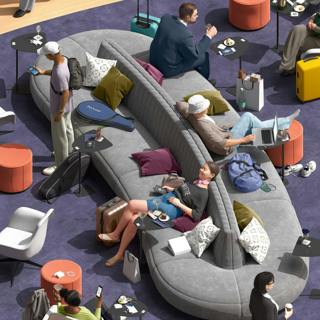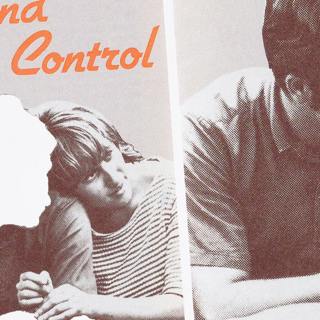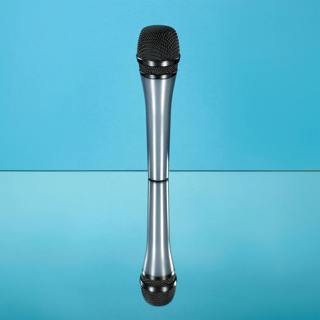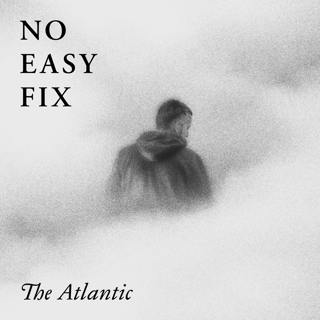
The Airport Lounge Arms Race
For years now, the fanciest places in air travel keep getting fancier. Airport lounges have become bigger, nicer, and far more ubiquitous than only a few years ago. They’ve gone from a nice place to wait between flights to full-blown luxury hideaways complete with free spa treatments. What happened? Amanda Mull, former Atlantic staff writer and explainer of all things consumer culture, tells the curious history behind the airport lounge and why—even if you never set foot in one—you’re still paying for them. Learn more about your ad choices. Visit megaphone.fm/adchoices
20 Juni 202427min

What Cities Can Teach Us About Life Online
Humanity’s transition to life online is disorienting, but perhaps not without comparison. According to the researcher danah boyd, people faced similar challenges in the transition to city life, meaning that the history of urbanization can offer lessons for humankind’s more recent mass digital migration. And if the rules and ways of cities have become clearer over the years, maybe there’s hope that the same can be said for life online. Boyd’s work is the focus of a recent episode of The Atlantic’s podcast How to Know What’s Real, with co-hosts Megan Garber and Andrea Valdez. This week, Radio Atlantic is showcasing that episode, with an introduction by host Hanna Rosin. Listen and subscribe to How to Know What's Real at any of these links: Apple Podcasts | Spotify | YouTube | Pocket Casts Learn more about your ad choices. Visit megaphone.fm/adchoices
13 Juni 202432min

How Do You Solve a Problem Like Homelessness?
Later this summer, the Supreme Court will rule on City of Grants Pass v. Johnson, one of the most important cases on homelessness to come up in a long time. The court will rule on whether someone can be fined, jailed, or ticketed for sleeping or camping in a public space when they’re homeless and have nowhere else to go. We talk to Atlantic writer and Good on Paper host Jerusalem Demsas about the case and what it may or may not solve. Homelessness has exploded since the 1980s, mostly in cities where housing costs have gone up. Criminalizing—or not criminalizing—people sleeping in public does not change the fact that many people have no other option, and that people who do have places to sleep can’t help but notice their cities have a huge homelessness problem. Get more from your favorite Atlantic voices when you subscribe. You’ll enjoy unlimited access to Pulitzer-winning journalism, from clear-eyed analysis and insight on breaking news to fascinating explorations of our world. Subscribe today at TheAtlantic.com/podsub. Learn more about your ad choices. Visit megaphone.fm/adchoices
6 Juni 202427min

Is Sasha Velour in Danger?
Sasha Velour won RuPaul's Drag Race with her spectacular rose-petal lip sync. She wrote and illustrated The Big Reveal: An Illustrated Manifesto of Drag, drew a New Yorker cover, and sells out almost every show of her New York revue, NightGowns. So why is she taking her act down to Murfreesboro, Tennessee, and Bartlesville, Oklahoma? We talk to Velour about this season of her HBO reality show, We're Here. At a moment when drag is both beloved and reviled, a powerful cultural force and a target, we ask Velour what exactly she's looking for in those places, and what essential truth about drag is hidden in the show's title. Learn more about your ad choices. Visit megaphone.fm/adchoices
30 Maj 202427min

Russia’s Psychological Warfare Against Ukraine
After months of struggle with little movement, the war in Ukraine may be nearing a crucial point. With American aid stalled for months, the fight has not been going well for Ukraine. Weapons and ammunition are once again on the way after the long-delayed package passed last month. But will it be enough in time? Russia has broken through the lines around Ukraine’s second-largest city and appears ready to threaten a wider offensive. Atlantic staff writer Anne Applebaum joins to discuss the state of the war and how the fight extends well beyond the battlefield itself. Her June cover story in The Atlantic chronicles the “new propaganda war” that Russia, China, and other illiberal states are waging on the democratic world, and how that war can shape the fate of Ukraine. Get more from your favorite Atlantic voices when you subscribe. You’ll enjoy unlimited access to Pulitzer-winning journalism, from clear-eyed analysis and insight on breaking news to fascinating explorations of our world. Subscribe today at TheAtlantic.com/podsub. Learn more about your ad choices. Visit megaphone.fm/adchoices
23 Maj 202431min

Finally, Male Contraceptives
Researchers have been hard at work on a number of male contraceptives that could hit the market in the next couple of decades. Options include a hormone-free birth control pill, an injection that accomplishes the same thing as a vasectomy but is easily reversible, and a topical gel men can rub on their shoulders that doesn’t affect mood or libido. There is a recurring theme in the research on male contraceptives: easy, convenient, minimal side effects. Which is very much not the focus of women’s contraceptive options. What changes in a future in which male contraceptives are readily available, and a routine part of men’s health care? We talk to staff writer Katie Wu. Get more from your favorite Atlantic voices when you subscribe. You’ll enjoy unlimited access to Pulitzer-winning journalism, from clear-eyed analysis and insight on breaking news to fascinating explorations of our world. Subscribe today at TheAtlantic.com/podsub. Learn more about your ad choices. Visit megaphone.fm/adchoices
16 Maj 202427min

The Chaos of AI Voice Cloning
What happens when voices can be copied so well they can fool friends, family… and voters? Staff writer Charlie Warzel has followed the explosion of AI technology with a mix of fascination and fear. DALL-E, Midjourney, Chat-GPT. New leaps in AI tech seem to happen every month now. Recently, he narrowed in on AI voice cloning for a feature for The Atlantic. He and host Hanna Rosin cloned their voices and tested it out before a live audience at the Cascade PBS Ideas Festival. What are the promises of the technology? And what are the perils? Related Atlantic Podcast: How to Know What's Real Subscribe here: Apple Podcasts | Spotify | YouTube | | Pocket Casts Get more from your favorite Atlantic voices when you subscribe. You’ll enjoy unlimited access to Pulitzer-winning journalism, from clear-eyed analysis and insight on breaking news to fascinating explorations of our world. Subscribe today at TheAtlantic.com/podsub. Learn more about your ad choices. Visit megaphone.fm/adchoices
9 Maj 202433min

If Plants Could Talk
Staff writer Zoë Schlanger is the proud owner of a petunia that glows in the dark. But she doesn’t just appreciate the novelty houseplant as work of science. Zoë sees its glow as a way to help us appreciate plants as more alive, more vital, and more complex than we humans typically do. Because in recent years, some scientists have reopened a provocative debate: Are plants intelligent? They’ve devised experiments that break down elements of this big broad question: Can plants be said to hear? Sense touch? Communicate? Make decisions? Recognize kin? Schlanger is the author of the upcoming book: The Light Eaters: How the Unseen World of Plant Intelligence Offers a New Understanding of Life in Earth. How could a thing without a brain be considered intelligent? Schlanger has spoken with dozens of botanists, from the most renegade to the most cautious, and she reports back on the state of the revolution in thinking. Get more from your favorite Atlantic voices when you subscribe. You’ll enjoy unlimited access to Pulitzer-winning journalism, from clear-eyed analysis and insight on breaking news to fascinating explorations of our world. Subscribe today at TheAtlantic.com/podsub. Learn more about your ad choices. Visit megaphone.fm/adchoices
2 Maj 202429min






















